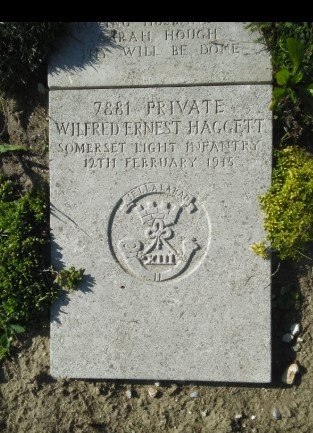Introduction
Wilfred Ernest Haggett is one of the village’s valiant war dead of 1914-18 and is commemorated on the memorial in the church. He was the first man from the village to lose his life in the war.
Childhood
Wilfred was born at Hardington Marsh in 1887, the third of five children born to Walter and Martha Haggett.[1] His father worked as a railway platelayer, and his mother was the daughter of Reuben Eastment, a farm labourer.
Wilfred’s parents married in 1882 and lived at Hardington Marsh until about 1888, when they moved to Pendomer. In April 1891, they were residing at Pen Dairy House.
After about four years at Pendomer, they returned to Hardington, initially living in a two-room house in Barry Lane and then moving to Rectory Lane around 1909.[2]
In March 1901, Wilfred’s father was still working as a platelayer, but by April 1911, he had left the railway due to health reasons and had taken a job as a farm labourer.
After leaving school, Wilfred and his older brother Walter both became general farm workers.[3]
Military career
The two brothers grew tired of farm work and decided to join the army. Walter enlisted in the Dorset Regiment on 19 November 1906.[4] It is unknown exactly when Wilfred enlisted, but it was around the same time.[5] His regimental number was 7881.[6]
By April 1911, he was a private with the 2nd battalion of the Somerset Light Infantry stationed in Malta.[7] During his seven years with the regular army, he also served in China and India.[8]
At the start of the First World War, Wilfred was in the reserves, which meant that he was liable for immediate call-up. His name appeared in a list of Hardington men fighting for their country in November 1914.[9] According to that list, he was serving with the 2nd Battalion of the Somerset Light Infantry, though he later transferred to the 1st Battalion.[10]
On 4 February 1915, precisely six months after Britain entered the war, Wilfred was seriously wounded while serving in France. He was taken to the Anglo-American Hospital at Wimereux, near Boulogne, but died of his wounds eight days later at the age of 27. He was the first man from the village to be killed in the war. The hospital chaplain wrote to Wilfred’s mother when he first entered the hospital and again to inform her of Wilfred’s death.[11]
Following his death, his father received his outstanding pay of £13 9s 9d on 15 April 1915 and £3 5s 6d on 5 July 1915, along with a war gratuity of £5 on 28 July 1919.[12]
References
[1] Civil Registration Birth Index; Hardington baptism register.
[2] RG13, piece 2297, folio 43, p.5; Hardington voters’ lists.
[3] RG13, piece 2297, folio 43, page 5.
[4] British Army World War I Service Records, 1914-1920.
[5] Western Chronicle, 26 February 1915, p.6.
[6] Soldiers Died in the Great War, 1914-1919.
[7] RG14, piece 34986.
[8] Western Chronicle, 26 February 1915, p.6.
[9] Western Chronicle, 6 November 1914, p. 6.
[10] Soldiers Died in the Great War, 1914-1919.
[11] Western Chronicle, 26 February 1915, p.6.
[12] Army Registers of Soldiers’ Effects, 1901-1929.

